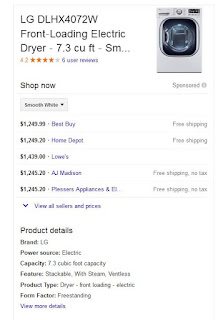Our 1970s era clothes dryer is a bit
more noisy than it should be. It is pretty easy and usually low cost to repair.
My area appliance store has a number of these machines in service yet, but,
I've been researching heat pump dry clothes dryers back before they were available in
the U.S. Now, they're here and it might be time to upgrade. It was harder
to justify buying a new dryer when the replacement would consume just as much
electricity as the old unit and repairing our current one was more cost
effective than purchasing a replacement.
My rural electric coop doesn't have much
info about heat pump dryers, but about 3 years ago, I found a link from their
national association that wasn't very kind to the new tech. The title -
"On the Way: A $2,000 Clothes Dryer" was kind of the first clue they would
rather you stayed with the higher KWH consuming dryer, though in the
article, a price point of $1000 to $2000 was mentioned. Looks like the title
price was off a bit.
After
listing many good features, lower energy costs, no outside venting, so lower
fire risk,and lower environmental impacts, the REC program manager
then noted “If you have a large family, no way
in the world can you get a device that takes twice as long to dry your
clothes.”. He concluded by suggesting that
members who wanted to save money should hang their clothes outside to dry.
Given this curmudgeon like advice, It was refreshing to see the new
found love for energy star dryers (including heat pumps) from the RECs in my
latest coop newsletter.
Who knows,
maybe the REC's can also change the "get off my lawn!" attitude they display
towards members who want to generate their own electricity, because a lot of
them will want to do just that!
As for
dryers, since we haven't purchased one yet, here's a gentleman who has
been living with a heat pump dryer for a while, and he's put much more info
together than any of the utility programs I've been able to find
About the
only items I would add. to his excellent blog post, is that retail electric
rates will probably continue to rise over the life of this appliance. Also,
many consumers will be replacing dryers with much less drying capacity than the
new dryer, resulting in many less dryer loads annually . Given these items,
consumers might see slightly improved economics than listed .


No comments:
Post a Comment